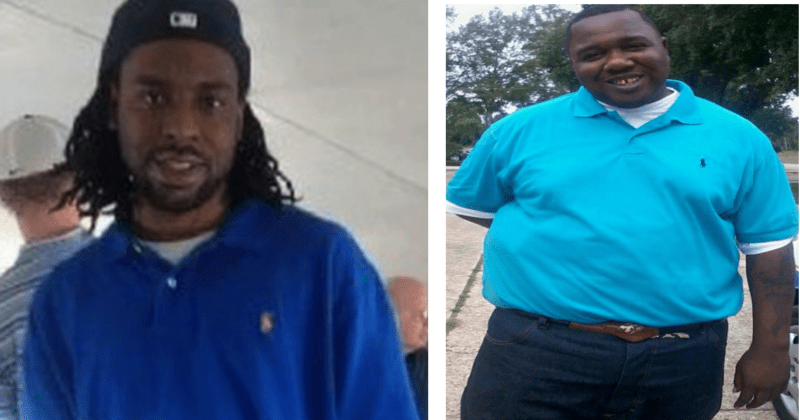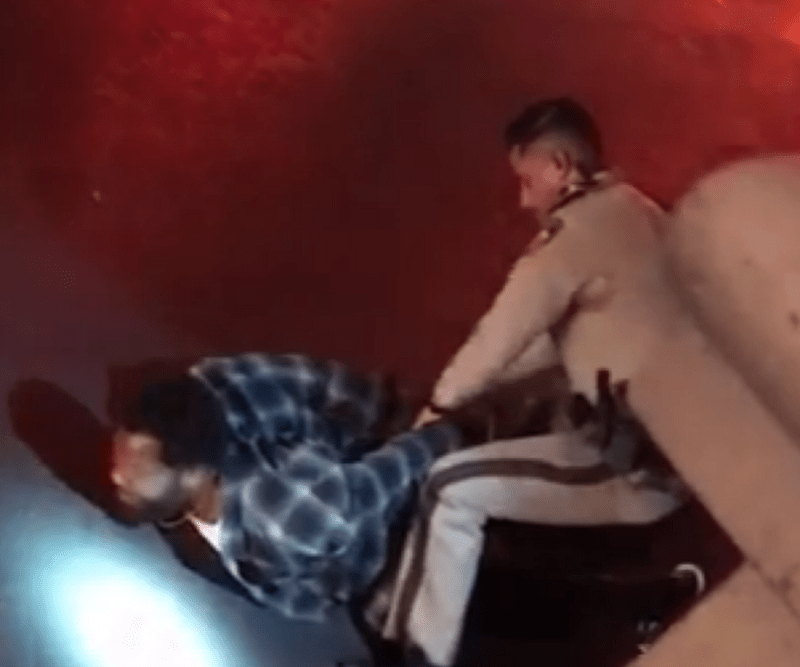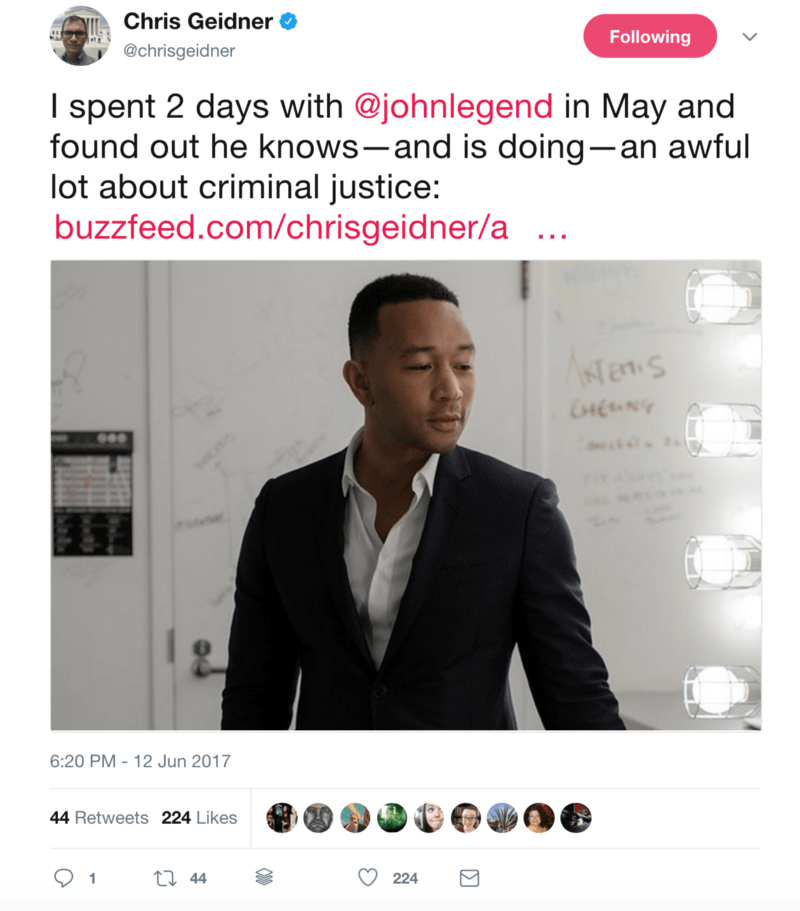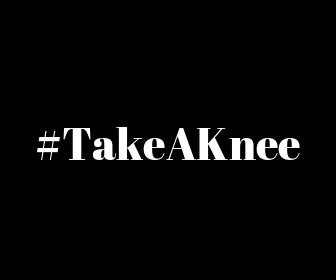What It Really Means To #TakeAKnee
If peaceful protests did nothing, the powerful wouldn't try so hard to silence them. #TakeAKnee pic.twitter.com/0aONI66gJF — NYCLU (@NYCLU) September 23, 2017 Donald Trump called on NFL owners to fire any “son of a bitch” player who took a knee during the national anthem. The players, coaches, and in some cases, owners, had a response. […]
Donald Trump called on NFL owners to fire any “son of a bitch” player who took a knee during the national anthem. The players, coaches, and in some cases, owners, had a response. On Sunday, a record 27 Jaguars and Ravens players took a knee as the national anthem played.
The Eagles and Giants locked arms. The Seahawks issued a powerful statement demanding better for the people of color who have been plagued by injustice. Along with the Titans and the Steelers, the team remained in their locker room as the anthem played. The national anthem singer in the Detroit Lions’ game, Rico Lavelle, ended on his knee. And in the irony of ironies for Trump, owners throughout the league condemned the President’s comments. Jaguars’ owner, Shahid Khan, protested with the players today.
When you try to stamp out protest in America, the resolve of our people only grows stronger. We’ve seen that throughout this country’s history from the Boston Tea Party to the fight for women’s rights to the lunch counters in Birmingham to the movement for marriage equality. If the president knew anything about our history, he would have seen this coming.
What shouldn’t get lost today is why these protests started — why Colin Kaepernick and others took a knee last year to protest police brutality and other injustices in the justice system. These players are not protesting the anthem or the flag. They are protesting because, in so many ways, it hasn’t stood up to the values that make this country great.

Colin began taking a knee the same summer that a suburban Minneapolis police officer shot and killed Philando Castile, a 32-year-old black man (who was legally carrying a handgun and told the officers he had it on his body) who police stopped allegedly because of a broken break light. Philando’s girlfriend and her young daughter were in the car at the time, and reported that Philando reached for his wallet when the officer killed him. The day before, in Baton Rouge, Louisiana, a police officer fatally shot Alton Sterling, a 37-year-old black man, though two officers appeared to have Alton pinned to the ground. The confrontation began when officers tried to arrest him for selling CDs outside of a convenience store.
Marshawn Lynch, a running back for the Oakland Raiders, said that he protests during the national anthem to show “ solidarity [and] to support people, especially people of color, who were and are still unjustly losing their lives at the hands of officers with little to no consequence.” He has also pointed to the devastating effects of mass incarceration, explaining that “after spending time with police officers on ride-alongs, meeting with politicians on the state and federal level and grassroots organizations fighting for human rights, it’s clear that our criminal justice system is still crippling communities of color through mass incarceration.”
Michael Bennett, a defensive end for the Seattle Seahawks, the son of a military veteran, is another player who uses his platform to protest injustice, especially racial injustice in America. Last month, he became a victim of police brutality. While attending a boxing match in Las Vegas, Bennett and dozens of others ran away from what sounded like gunshots. Out of all of those who ran away, police officers focused on Bennett, drew their weapons, ordered him to the ground, and placed a knee in his back. Bennett has recounted how difficult it was to breathe at that moment. Bennett, has described officers threatening to “blow his fucking head off…I felt helpless as I lay there on the ground handcuffed facing the real-life threat of being killed … All I could think of was I’m going to die for no other reason than I am black and my skin color is somehow a threat.”

Police play a critical role in keeping communities safe, but their ability to do so depends on public trust. When police shoot unarmed men, they erode that trust. When they engage in discriminatory search and seizures, they undermine the community’s faith that people of color are receiving a fair chance. When police forces do not discipline those officers who violate the rights of those they are supposed to protect, it impacts the ability of community and law enforcement to work together to reduce violence. Players like Colin Kaepernick, Marshawn Lynch, and Michael Bennett bring these critically important issues to the fore of public attention.
It’s not just police brutality that drives these players to take a knee or raise a fist. Consider the advocacy of Malcolm Jenkins of the Philadelphia Eagles and Anquan Boldin, who retired from the Detroit Lions this year to focus on philanthropy.
Boldin and Jenkins have taken a strong stance against life without parole sentences for juveniles, which is fitting given that Detroit and Philadelphia are among the top five counties in America that still sentence children to die in prison. Both players also are at the helm of an effort to remove obstacles to reentry for formerly incarcerated citizens, including meeting with grassroots activists, community members, and legislators to pass Clean Slate legislation in Pennsylvania.
The legislation would require the automatic sealing of records for those with non-serious convictions after ten years. This would be life-altering for people like Ronald Lewis, a 38-year-old father of three who mentors neighborhood kids and runs his own HVAC business, but cannot secure contracts at places like Home Depot because of the misdemeanor record he obtained 13 years ago.
As Jenkins recently told the Philadelphia Citizen, “common non-violent misdemeanors — disorderly conduct; unreasonable noise; trespassing; scattering rubbish; criminal mischief; graffiti — can follow someone for life. Every job application, every attempt to get a lease for an apartment, or a mortgage for a house, finds one out of every three Pennsylvania working citizens having difficulty moving on with their lives due to the stigma of having a prior record.”
Malcolm’s teammate, Torrey Smith, also has pushed for second chances: “You’ve seen me argue about criminal justice for a long time. I’m a firm believer in second chances. My family’s had a lot of legal issues in the past. If you make a mistake, it doesn’t mean you have to be that way forever. I believe in that. I believe in second chances.”
When Boldin was asked about why Trump gets it wrong and why it is so important for these players to protest, he said: “Players taking a stance against injustices is nothing new. In order for us to make a true impact, however, everyone needs to come together and make the fight for human rights, equality and reform a priority. Advocating for those who don’t have a voice, for those who feel like justice hasn’t been served for them. Now is a more important time than ever to come together in unity and solidarity.”
It is hard to overstate the significance of their work for criminal justice reform. Recently, Malcolm Jenkins, Torrey Smith, Chris Long, Rodney McLeod, Eagles’ team owner Jeff Lurie, and NFL Commissioner Roger Goodell watched bail hearings in Philadelphia, witnessing dozens of people not convicted of a crime remain locked up because they were too poor to buy their way out. When players take a knee or link arms and then talk about these issues, it raises our consciousness about how, on any given night in America, 400,000 people are held in jail without being convicted simply because they cannot afford to purchase their freedom.
The injustice that drives these protests and advocacy is not going unnoticed outside of the NFL either. Athletes, musicians, and entertainers across every arena are rapidly joining the chorus of those who are demanding a more just and humane criminal justice system in this country.
On Friday night, Oakland Athletics catcher Bruce Maxwell, son of a military veteran, became the first major league baseball player to take a knee.
Or consider Maya Moore, star player for the Minnesota Lynx, who wore a tee-shirt during a game last year to protest the policing killing of Philando Castile and to demand justice and accountability for officers who needlessly shoot unarmed black men. Dozens of other WNBA players joined in protest. Moore also has used her platform to discuss wrongful convictions and to explain the tremendous power that prosecutors have in the justice system.
Steph Curry, the Golden State Warriors all-star who Trump “disinvited” to the White House this weekend, signed onto a petition to reform the criminal justice system by cutting the incarcerated population in half over the next ten years. He also participated as a mentor in President Obama’s historic “My Brother’s Keeper” initiative.
On Saturday night, Stevie Wonder took a knee before his performance at the Global Citizen Festival in New York’s Central Park. That continued a long list of acts of solidarity from the entertainment industry on behalf of racial injustice, especially in the criminal justice system.
Common, who is visiting prisons and spending time with the incarcerated, is helping to raise the attention that Americans pay to how we treat our neighbors who are confined behind bars. Writing for USA Today earlier this year, Common said: “During the tough-on-crime era of the 1980s and 1990s, incarceration became less about rehabilitation and more about isolation. People who aren’t incarcerated take a lot for granted: having someone to listen to us, shaking someone’s hand and hugging them, looking them in the eye and making a human connection. For us, positive interaction is an expectation. For inmates, it is a rare exception. Most of the prisoners I spoke with committed crimes when they were adolescents. That doesn’t mean they shouldn’t serve time. But many of them aren’t the same people they were when they came in, just like none of us are the same people we were decades ago.”
On Father’s Day, Jay-Z wrote a piece for Time Magazine on the urgent need for bail reform. As Jay-Z wrote, “When black and brown people are over-policed and arrested and accused of crimes at higher rates than others, and then forced to pay for their freedom before they ever see trial, big bail companies prosper. … We can’t fix our broken criminal justice system until we take on the exploitative bail industry.”

Athletes and entertainers, like the Eagles’ Malcolm Jenkins and other NFL players, are also testifying before Congress and state legislatures and pushing for policy change. John Legend, for example, who started the #FreeAmerica campaign, testified in Louisiana earlier this year on behalf of a now-enacted law that will decrease the state’s prison population by more than 10%. Legend told the legislators, “We can’t tolerate a system that destroys so many lives and so many communities … Mass incarceration is ineffective, it’s harmful and it’s expensive.” Legend also pushed the legislators to include reforms aimed at giving people who commit more serious crimes an opportunity for redemption and release, too, and to end life without parole sentences for juveniles.
So, what does it mean when NFL players — and players from the MLB, WNBA, and now even in a tennis match — take a knee or leave the arena before games? It means that the country is energized and ready to take on criminal justice reform and fight to end the racial injustice still pervasive in America. It means that these athletes stand in solidarity with each other, with recordings artists and other entertainers, and with the millions of Americans who believe the time is now to create a more humane and accountable justice system.

